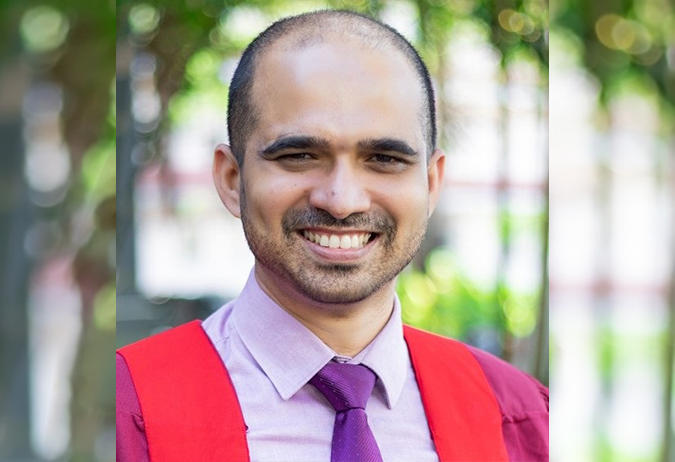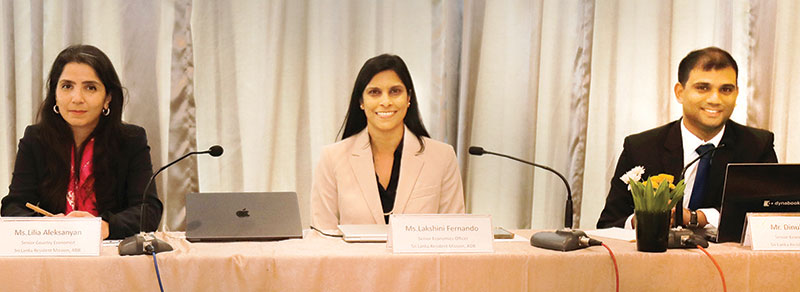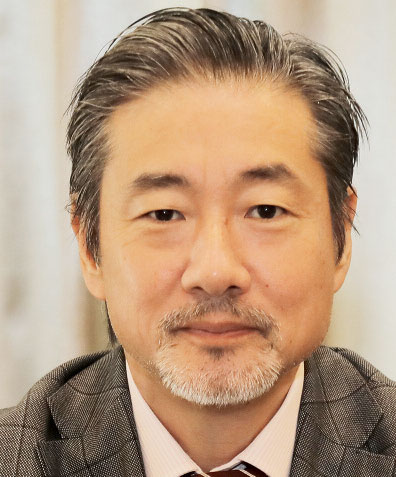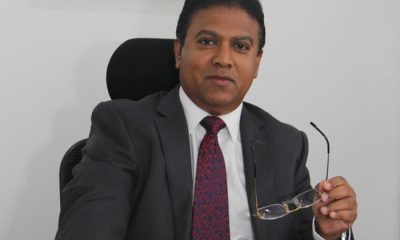Business
Academic says there’s a ‘silver lining’ in brain drain

-
SL diaspora is privy to most updated technologies in advanced economies
-
Govt can take a cue from India and introduce a special visa category for them
-
Diaspora entrepreneurs’ linkage with global networks should be harnessed
by Sanath Nanayakkare
Policymakers can encourage the Sri Lankan talent pool which is spread across the developed countries to shift their base back home if they pull the right policy levers, said the head of department of a leading university in Sri Lanka.
Dr. Janaka Fernando, Head of Department of Business Economics, Faculty of Management Studies and Commerce at the University of Sri Jayewardenepura said so in the backdrop of widely spreading fear that skilled migration will have overwhelmingly negative effects on Sri Lanka.
Exclusively speaking to The Island, he said,” The Sri Lankan talent pool which has found stable doing business and improved living conditions in developed countries can be lured to shift or relocate their operations in Sri Lanka if the policymakers correctly identify their capacities, interests and their patriotism.”
“A fair share of this Sri Lankan talent pool in those countries would come back home to start new businesses in their motherland if the authorities make the domestic environment conducive to professionalism, startups, incubator nest hubs, industrial parks etc.,” he said.
The following are some excerpts from the interview with Dr. Fernando.
“Brain drain isn’t a new phenomenon in Sri Lanka. It has been in existence for more than six decades and it occurred in different ways at different stages of our history. The diaspora includes all communities of the country, not only Tamils as erroneously interpreted very often. With the gaining of Independence from the colonial masters in 1948 and with the advent of the Sinhala Only Act in 1956, economically and administratively active European descendants who had made Sri Lanka their second home left the country for good.
Subsequently, in the first few years of 1970s when the features of a closed-economy were dominant in the country, many professionals including doctors, engineers and lawyers left Sri Lanka to live and work the in the West. I would be remiss if I didn’t mention the legacy of what came to be known as Black July in 1983 where Tamil separatists had stepped up militant attacks in the North killing 13 soldiers, and over the next few days, some members of the Sinhalese majority took revenge causing havoc around the country. This unfortunate turn of events led to a mass exodus of educated members of the Tamil community to other countries.
And in the 1990s-2000s when bomb blasts were taking place and the country engaged in a war to crush terrorism, another wave of Tamil professionals departed from Sri Lanka. Around this time, universities had been closed for three consecutive years from 1986 to 1989 due to political unrest and many students from affluent families left the country to pursue their higher education in foreign countries. So, this is a brief overview of how migration happened in the past. And today, we are witnessing the largest-ever exodus of qualified professionals as a result of the deeper implications and consequences of the current economic crisis.”
“You see, this time the brain drain is starkly different from the past scenarios and you cannot really blame the people going out because who does not want to improve standard of life? However, I think this situation has a silver lining too. If the policymakers take advantage of the often-overlooked aspects, the brain drain could be turned into a win-win situation for the country as well as the skilled migrants in the medium to long term.”
“Not only in Sri Lanka, the migration of skilled workers is a persistent trend in many developing countries, and therefore, as a country we need to look at how we can strategically attract skilled migrants to come back after some time and make Sri Lanka more attractive to international capital investment as well as an oasis for knowledge industries which are based on intensive use of technology and human capital.”
“We need to understand that migration takes place because of push factors in Sri Lanka and pull factors in the receiving countries. So, the authorities must avoid measures to limit or tax skilled migrants’ decisions to leave the country because it goes against the democratic norms of the country and the fundamental freedom of choice. Instead, the authorities should facilitate them to migrate because these skilled professionals are privy to most updated technologies and best work practices in those countries.”
“Let’s not forget that many of our professionals abroad have built purposeful connections and networks in these advanced economies, therefore, Sri Lanka can leverage this ‘brain circulation’ for its rapid development and economic growth. If we harness it properly, it can trigger a flow back of knowledge, new technologies and foreign direct investments (FDI) to the country.
If we can entice at least a small percentage of the Sri Lankan diaspora to come back and operate from Sri Lanka, they will have the capacity to form the back bone of a new economic order especially by innovating lucrative products for the global ICT marketplace. So the government must work towards the goal of providing them with amenities similar to what they would get in the foreign lands they go to. If we can do this, we will be able to attract back at least a few of them who have the true transformative capacity to help Sri Lanka in its growth journey.”
“Already without any government intervention, a few individuals of Sri Lanka’s patriotic diaspora have shifted their base back home because they identified the favourable opportunities in Sri Lanka. Virtusa Corporation founded by Kris Canekeratne, WSO2 founded by Dr.Sanjiva Weerawarana, CodeGen founded by Dr. Harsha Subasinghe, Orion City founded by Jeevan Gnanam, for example, have earned a lot of name and fame for what they are specialized in and have become foreign currency revenue earners to reckon with, in their respective fields.
They interconnected their operations to Sri Lanka driven by their own passion and passed the benefit to the county regardless of little support from the policymaking side. But such passionate volunteering by the Sri Lankan diaspora needs to be spurred by the government without much delay. The government can take a cue from India in this regard and introduce a special visa category for the diaspora members, and create tech hubs and science parks to facilitate them to bring their operations to Sri Lanka. When such visionary entrepreneurs come, other professionals also will see that the country is doing all the right things to achieve its full growth potential, and they will also jump on the growth bandwagon,” Dr. Janaka Fernando said.
Business
ADB urges SL to accelerate recovery with fiscal discipline and global trade shifts

Recommends prudent policy choices and regional collaboration
The Asian Development Bank (ADB) has highlighted Sri Lanka’s economic recovery as exceeding initial expectations in its Asian Development Outlook April 2025 report, but cautioned that the rebound remains fragile, with significant risks posed by global trade tensions, fiscal pressures, and unresolved debt vulnerabilities.
The following are some key highlights from the report:
Sri Lanka’s economy is projected to grow at a moderate pace in 2025–2026, driven by broad-based improvements. However, domestic demand is expected to stay sluggish, reflecting lingering challenges from the country’s recent economic crisis. While fiscal consolidation efforts remain on track bolstered by stronger-than-anticipated revenue. With that said, however, the ADB warned that under-execution of capital spending or a loss of reform momentum could derail progress.

Takafumi Kadono, ADB Country Director for Sri Lanka, brings profound expertise in both macro and microeconomic dynamics, steering transformative development support tailored to Sri Lanka’s evolving needs
After a period of deflation, Sri Lanka’s inflation is forecast to rise in 2025 due to higher electricity tariffs, relaxed import restrictions, wage hikes, and exchange rate depreciation. The government’s commitment to fiscal discipline faces pressure from potential expenditure increases, even as external debt interest payments resume, pushing the current account into deficit.
The ADB’s analysis of new US tariffs, identifies Sri Lanka as vulnerable to trade disruptions. Key risks include:
Sri Lankan exporters, particularly in sectors with thin profit margins, face order cancellations and profit losses.
Competitors like India, Malaysia, and Mexico—benefiting from lower US tariffs—could attract investment away from Sri Lanka.
Full implementation of tariffs could slash GDP growth by depressing exports, manufacturing, and investor confidence, while raising unemployment and fiscal strains.
To mitigate risks, the ADB urges Sri Lanka to diversify export markets and products. Opportunities include expanding into niche EU markets and Asian regional partners, as well as boosting high-value sectors like electronics. Strengthening regional cooperation and accelerating structural reforms could enhance resilience.
Despite progress under its IMF program, Sri Lanka’s debt burden remains “high,” requiring sustained reforms to stabilise public finances. The ADB emphasised that fiscal reversals or delays in restructuring could undermine macroeconomic stability.
While South Asia remains the fastest growing subregion fueled by India’s robust domestic demand, Sri Lanka’s trajectory is distinct, marked by post-crisis recovery challenges. Developing Asia’s overall growth is moderating due to US-China trade tensions and China’s property sector woes, further complicating Sri Lanka’s external environment.
“Sri Lanka’s recovery is commendable but incomplete,” the report states. “Accelerating reforms, safeguarding fiscal discipline, and diversifying trade partnerships are critical to navigating global headwinds and ensuring long-term stability.”
As Sri Lanka balances optimism with fragility, the ADB’s outlook underscores the urgency of maintaining reform momentum while preparing for escalating external risks. The path to sustained recovery, concludes, hinges on prudent policy choices and regional collaboration.
By Sanath Nanayakkare
Business
HOPPR Unveiled: PayMaster’s latest innovation that transforms ride-hailing and digital credit access

PayMaster, the leading, award-winning digital payments app in Sri Lanka, has announced its launch of HOPPR, a cutting-edge ride-hailing feature that will transform the market by providing all stakeholders from drivers and customers with financial independence through digital payments and credit access. More than just a ride-hailing service, HOPPR is a tool for financial empowerment that works in unison with PayMaster to allow users to schedule rides without using cash and to open up long-term revenue streams.
A sustainable revenue strategy is established by its unique referral system, which allows drivers to receive lifetime earnings for each user referred, emphasizing that both passengers and drivers are not just participants but valued stakeholders of the platform. Additionally, CREDDY, an AI-powered credit system that acknowledges informal income streams, is connected with HOPPR where drivers can obtain revolving credit of up to Rs.50,000 at 0% interest through CREDDY for everyday expenses, fuel, and vehicle repairs, assisting in closing gaps in their finances and fostering financial stability.
Ransika De Silva, Director/CEO of PayMaster, stated, “With HOPPR, we have built a driver-centric system where each ride is an opportunity to earn, save, and grow financially rather than just a journey. We are changing the financial landscape for gig workers and informal earners, starting with ride-hailing, digital payments, credit access and future expansion into areas for informal income.”
PayMaster is a one-stop app for payments that makes transactions in Sri Lanka easy. From local money transfers, receiving money from around the globe to a local account within two seconds, paying bills, and topping up mobile accounts, users can now also use ride-hailing services thanks to HOPPR. PayMaster, a fully owned subsidiary of Singapore-based FinTech FirstPay (Pte) Ltd, guarantees the highest international security standards by following the criteria for mobile apps from the Central Bank of Sri Lanka (CBSL) and submitting to frequent security assessments conducted by a globally reputed auditing firm.
Business
CSE launches in bullish vein, energized by US President’s ‘90-day pause’

The CSE opened yesterday in a bullish manner after US President Donald Trump announced a 90-day pause on enforcing increased tariffs on exports.
President Trump said he is ordering a pause on ‘reciprocal’ tariffs slammed on Sri Lanka and other countries after 75 countries offered to negotiate, amid a collapse of stock markets, but a 10 percent tax would remain. Many stock markets around the world were back in the green.
The All Share Price Index was trading up on 693 points within the first half hour of opening and the more liquid S&P SL20 was up 6.42%, or 286 points, at 4,632.00.
Turnover was Rs 6.1 billion with ten crossings. Those crossings were reported in JKH which crossed 30.7 million shares to the tune of Rs 607 million and its shares traded at Rs 20.10, Sampath Bank 3.7 million shares crossed for Rs 419 million; its shares traded at Rs 150, Commercial Bank 2.2 million shares crossed for Rs 151 million; its shares traded at Rs 125.
Singer (Sri Lanka) 1.5 million shares crossed for Rs 52.5 million; its shares traded at Rs 35, Vidul Lanka 3.7 million shares crossed for Rs 49.4 million; its shares traded at Rs 13.50, People’ Leasing 2 million shares crossed to the tune of Rs 35 million; its shares sold at Rs 2.70, HNB 100,000 shares crossed to the tune of Rs 30.5 million, Hemas Holdings 210,000 shares crossed for Rs 23.4 million; its shares traded at Rs 117, LMF 500,000 shares crossed to the tune of Rs 21.4 million; its shares fetched Rs 42.70 and DFCC 200,000 shares crossed to the tune of Rs 20 million; its shares traded at Rs 100.
In the retail market top six companies that have mainly contributed to the turnover were; Sampath Bank Rs 709 million (6.2 million shares traded), Commercial Bank Rs 626 million (4.4 million shares traded), HNB Rs 619 million (two million shares traded), JKH Rs 346 million (three million shares traded), RIL Properties Rs 164 million (10.3 million shares traded) and Brown’s Investments Rs 161 million (22.1 million shares traded).During the day 212 million shares volumes changed hands in 23287 transactions.
Yesterday, US dollar buying rate was Rs 297.50, while the selling rate was Rs 298.60.
By Hiran H Senewiratne
-

 Business5 days ago
Business5 days agoColombo Coffee wins coveted management awards
-

 Business7 days ago
Business7 days agoDaraz Sri Lanka ushers in the New Year with 4.4 Avurudu Wasi Pro Max – Sri Lanka’s biggest online Avurudu sale
-

 Features6 days ago
Features6 days agoStarlink in the Global South
-

 Business7 days ago
Business7 days agoNew SL Sovereign Bonds win foreign investor confidence
-

 Features3 days ago
Features3 days agoSri Lanka’s Foreign Policy amid Geopolitical Transformations: 1990-2024 – Part III
-

 Features6 days ago
Features6 days agoModi’s Sri Lanka Sojourn
-

 Midweek Review3 days ago
Midweek Review3 days agoInequality is killing the Middle Class
-

 Features5 days ago
Features5 days agoSri Lanka’s Foreign Policy amid Geopolitical Transformations: 1990-2024 – Part I












